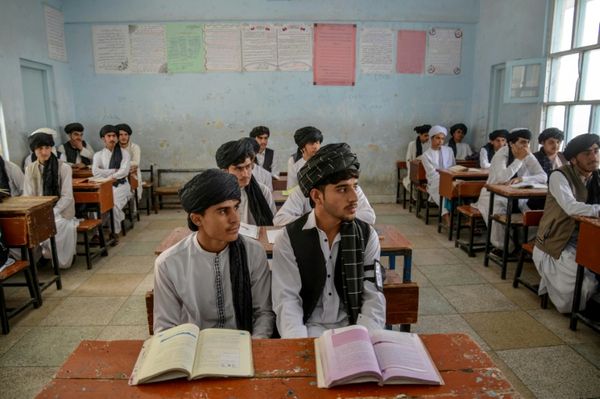There is not much that Vern Hilditch has not seen in his 50 years of teaching — technology has improved, fashions have come and gone, and teaching methods have improved and adapted.
But one thing that's been ever-present in his tenure is the need — and shortage — of teachers in Australia.
"When I started in the 70s, we were looking at massive teacher shortages," Mr Hilditch said.
"Then we were doing a massive amount of importing teachers from America and Canada, jumbo jet loads.
"And now we're back at it again."
Australia finds itself in what has been described as a "generational crisis" due to a lack of teachers nationwide.
Victoria's extreme teacher shortage reached a crisis point at the start of the year when more than 900 positions in government schools were advertised before students had even returned to the classroom.
The exodus has undoubtedly been exacerbated by the impacts of a global pandemic that's changed the way we work, as well as live.
But Mr Hilditch said that apart from a small period in the 1990s, the merry-go-round of teacher shortages is nothing new.
"Here we go again. This is like the 70s all over again," he said.
"But this is the toughest, in terms of school staffing, that I've ever experienced."
Why are they leaving?
Federation University's Robyn Brandenburg is part of a national team that has interviewed and analysed responses from teachers that have recently left the classroom.
Professor Brandenburg, along with researchers from University of Southern Queensland, University of Melbourne, and the University of Sydney, analysed feedback from 255 former teachers from across Australia in an attempt to answer the elusive question — why did they leave?
"We are now at a critical stage where teachers are leaving in droves," Professor Brandenburg said.
The study in many ways confirmed what was already feared — there's no single reason why teachers leave and no silver bullet to fix the sector's woes.
Professor Brandenburg said workload, a general lack of respect, and the absence of a "living wage" were among the main reasons teachers gave when leaving the job.
The majority of leavers, about 70 per cent, were in the secondary school system, with one in 10 respondents leaving the education industry completely.
But that was not the most surprising element of the research conducted.
"The thing that caught us off guard was the … fact that [the job] had an impact on their health and wellbeing while they were teaching, and that it's had an impact since they've left," Professor Brandenburg said.
"Our hope is that this research will help reveal what it might take to retain our teachers and halt this exodus."
Mental toll nothing new, teachers say
The idea of a burned-out teaching brigade is nothing new to secondary school teacher Dani Scanlon.
The English and Humanities teacher returned from the term 1 holiday break to the news another of her colleagues had given two weeks' notice.
It comes as her central Victorian school continues to look for a replacement for another teacher that is due to begin maternity leave.
"I think if you felt supported by parents and students and your leadership, you sort of could deal with that a lot better," Ms Scanlon said.
"Teacher wellbeing is going downhill. There's no support from the department or from the school leadership that affects your wellbeing and, of course, you're more likely to just say, 'well, I quit'.
"You're looking after yourself because you're probably more in survival mode."
But Matt Hendry, a learning specialist from Cobram, said that did not have to be the way.
Mr Hendry has spent 15 years at the one school and believes respect is key to retaining a dwindling workforce.
"If you feel like you're getting the reward from it, and you feel like you're valued and you're making a difference, and you're being supported by students and their families, it probably makes it all worth it," he said.
"But if you don't feel that, and you're putting in all that hard work, I guess it makes it really hard to keep running up."







